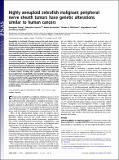Highly aneuploid zebrafish malignant peripheral nerve sheath tumors have genetic alterations similar to human cancers
Author(s)
Zhang, GuangJun; Hoersch, Sebastian; Amsterdam, Adam; Whittaker, Charles A.; Lees, Jacqueline; Hopkins, Nancy H.; ... Show more Show less
DownloadHopkins_Highly aneuploid.pdf (1.579Mb)
PUBLISHER_POLICY
Publisher Policy
Article is made available in accordance with the publisher's policy and may be subject to US copyright law. Please refer to the publisher's site for terms of use.
Terms of use
Metadata
Show full item recordAbstract
Aneuploidy is a hallmark of human cancers, but most mouse cancer models lack the extensive aneuploidy seen in many human tumors. The zebrafish is becoming an increasingly popular model for studying cancer. Here we report that malignant peripheral nerve sheath tumors (MPNSTs) that arise in zebrafish as a result of mutations in either ribosomal protein (rp) genes or in p53 are highly aneuploid. Karyotyping reveals that these tumors frequently harbor near-triploid numbers of chromosomes, and they vary in chromosome number from cell to cell within a single tumor. Using array comparative genomic hybridization, we found that, as in human cancers, certain fish chromosomes are preferentially overrepresented, whereas others are underrepresented in many MPNSTs. In addition, we obtained evidence for recurrent subchromosomal amplifications and deletions that may contain genes involved in cancer initiation or progression. These focal amplifications encompassed several genes whose amplification is observed in human tumors, including met, cyclinD2, slc45a3, and cdk6. One focal amplification included fgf6a. Increasing fgf signaling via a mutation that overexpresses fgf8 accelerated the onset of MPNSTs in fish bearing a mutation in p53, suggesting that fgf6a itself may be a driver of MPNSTs. Our results suggest that the zebrafish is a useful model in which to study aneuploidy in human cancer and in which to identify candidate genes that may act as drivers in fish and potentially also in human tumors.
Date issued
2010-09Department
Massachusetts Institute of Technology. Department of Biology; Koch Institute for Integrative Cancer Research at MITJournal
Proceedings of the National Academy of Sciences
Publisher
National Academy of Sciences (U.S.)
Citation
Zhang, G., S. Hoersch, A. Amsterdam, C. A. Whittaker, J. A. Lees, and N. Hopkins. “Highly aneuploid zebrafish malignant peripheral nerve sheath tumors have genetic alterations similar to human cancers.” Proceedings of the National Academy of Sciences 107, no. 39 (September 28, 2010): 16940-16945.
Version: Final published version
ISSN
0027-8424
1091-6490